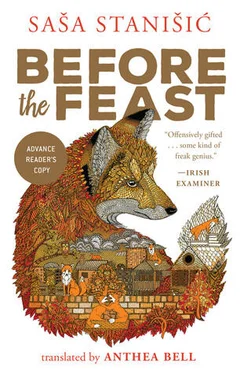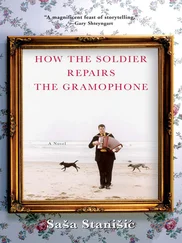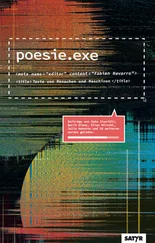Of course the fact that Frau Rebe was good-looking is no excuse for murder.
Herr Schramm had liked Rüdiger. He was Herr Schramm’s first boss after the fall of the Wall. Rüdiger had taught him a few things about tractors, or he surely wouldn’t have been taken on later by Von Blankenburg Agricultural Machinery.
Herr Schramm whistles the Crime Scene tune; well, so it didn’t work with the car, he’ll have to use his pistol after all.
The Rebe case would have been a good one, because a few days after the murder her husband was taken in by the police. To this day no one knows why. Jealous husband, wife generous with her favors. People will always talk. Then the apprentice was arrested, and Herr Rebe was a free man again.
The boy never admitted it. He did admit that he’d have liked to take a look under Frau Rebe’s coat, yes. And that on the night of the crime, it was the night before the Feast back then, too, he’d asked if he could look. He’d really just wanted to look, not touch. Under her beautiful coat. But she wouldn’t let him. In the end they both went their separate ways. There wasn’t any more to admit, he said.
Herr Schramm whistles, and Herr Schramm puts the pistol to his temple, but he raises his head from the steering wheel, so that when he’s dead he won’t look like one of those dead drivers at the wheel in Crime Scene . He even tries to slip down between the seats, so as to make quite sure, but there is a knocking on the pane. A young woman is standing there, making the gesture that means: wind down the window, although even Schramm’s old Golf has windows that go down automatically.
18 MARCH 1927. INCIDENT HAS FATAL OUTCOME.
A Chinaman peddling his wares from door to door without an official permit was stopped by Police Sergeant Polster. The Chinaman spoke angrily to Polster and attacked him violently, so that the Sergeant was obliged to make use of his sword. When the Chinaman wrenched the sword from his grasp and attacked the officer with it himself, Polster fired his pistol and struck his opponent down. The Chinaman, severely injured, was taken to hospital in Prenzlau, where he passed away soon afterward.
No one could understand his last words.
WE TAKE AN INTEREST IN THE ELECTRONIC LOCK on the massive oak door to the Archivarium. The Homeland House was renovated in 2011, and the old padlock was replaced by a lock with a code that you have to tap in. 2011 was 700 years after the first mention of Fürstenfelde in the records, and between January and July three young drivers collided with the plane trees. One of them did not survive: Thorsten Brandt, a passionate computer-game player, placed third at the German Counter-Strike Championship in the team event.
Only the History Society knows the code.
We take an interest in all that secrecy.
The Homeland House celebrated the 700th anniversary of Fürstenfelde with an Open Day. Even the Archivarium was to be opened. Frau Schwermuth wore local costume, although it wasn’t 100 percent certain what locality the costume came from. The Mayor made a speech, mentioning the new lock among other things. She called Fürstenfelde a site, because that always sounds like new jobs. She waved her arms about as if showing the size of a very large fish. Then Frau Schwermuth tapped the code into the lock, and the massive wooden door swung open, buzzing.
Ooh, aah, applause.
The walls were covered with sheets, but the room was empty except for a Perspex podium with a stack of papers on it, and about eight members of the Sound and Smoke Firefighters’ choir. They had had to wait in that little room behind the locked door for an hour because of delays to the planned course of events. They looked annoyed and heated.
The papers were the original manuscripts of the chronicle of the village by Paul Wiese, which is famous all over the village. Frau Schwermuth had “acquired” the chronicle from the Museum of Brandenburg History for the anniversary celebrations.
We were disappointed. We had hoped for better from the Archivarium. Frau Schwermuth explained that for want of suitable means of displaying them, and in the expectation of large crowds, she had been obliged to take the items in the Archivarium, which after all were valuable, to be kept in a place of safety. Not everyone went along with that, but fair enough.
Sound and Smoke gave it all they had. The acoustics of the cellar were sensational. Senior citizens went red in the face, junior citizens took their hands out of their pockets. The vaulted room was very full. The unhewn rock of the walls was sweating. The air almost ran out with all those people in the cellar, just ask Frau Kranz.
Our historical interest in Paul Wiese is confined, at the most, to Paul Wiese’s melancholy. In his day, Wiese tried to compile records of all the houses in the village and their inhabitants. Such-and-such a house built at this or that time by such-and-such a person, passed into the possession of whatsisname, fell into ruin at such-and-such a time or was still standing. A joke here, an anecdote there. Sentences beginning “Ah!” and charmingly excited, as melancholics tend to be when they have a good story to tell. Paul Wiese liked Fürstenfelde. A man who longed for steadiness in unsteady times.
The old windmill was demolished in 1930. I was there to see it come down. The demolition was necessary; it was extremely dilapidated. In 1945 the miller’s house burned down and was destroyed. I saw the flames. No one had to light a fire. What will happen now we cannot tell. Everything is transitory. .
There’s a portrait of Paul Wiese, a charcoal sketch done by Frau Kranz from a photograph. A man with a round head and a small moustache. His eyes are full of regret. We take a historical interest in whatever Wiese’s eyes are regretting.
We are even more interested to know why, on the Open Day at the Homeland House, all the other doors had to be locked while the door of the Archivarium was open. Even the doors on the ground floor, and even after Frau Kranz was left gasping for air when the Firefighters’ choir sang the folk song “Cling-clang,” and Imboden only just managed to catch her before she fell down in a faint as the singers reached “the tolling bell.”
Cling-clang, drink up and sing! / Tomorrow may yet bring / The ringing of a knell. / The world may fall apart / but sing with all your heart / above the tolling bell .
For the curious, copies of Wiese’s melancholy writing were available next day, ready for anyone on a little table between the tiled stoves.
To this day, however, no one has had a sight of the archives. Aren’t archives there to be consulted? Ah, but there is so much material, says Frau Schwermuth, and it hasn’t all been properly assessed yet. In addition, some of the documents are so fragile that they seem to tremble when you look at them for any length of time. So fragile and so valuable.
Well, let’s hope they’re valuable! If not, the parish would hardly have paid good money for the new lock and the humidity-regulating thingummy, while the Nordkurier complains that the long-distance cycle path is in a “shocking” condition where it reaches Fürstenfelde; the last time it was cleared was when Rudolf Scharping, the cycling politician, rode from Berlin to Usedom when he was standing for Chancellor.
Okay, so it’s not quite true that we don’t get a sight of the archives. Frau Schwermuth provides it. She notes down what we want to know, and makes copies if she finds anything. Or doesn’t make copies, but says, “Come back the day after tomorrow,” and we do go back the day after tomorrow. And if it takes longer than that, she says, “Things don’t move as quickly as all that in the past,” or something similar, and her heavy head sways on the neck under it, which is much too thin, like those long rocking horses you see in kids’ playgrounds going up and down on their metal springs.
Читать дальше












